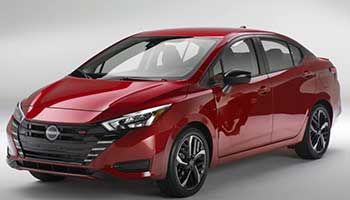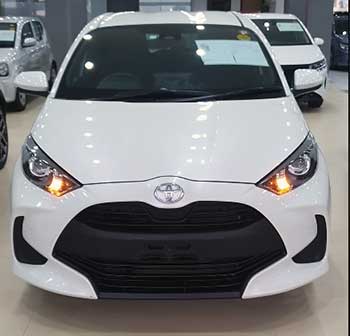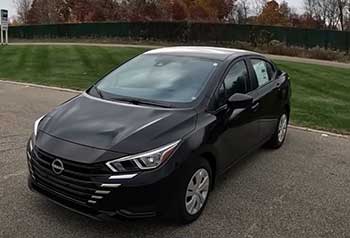
I recently set out to compare two of the most popular subcompact cars on the market: the Nissan Versa and the Toyota Yaris.
My goal was to understand which car offers the best value, performance, and reliability for budget-conscious buyers like you.
After test-driving both, researching their features, and analyzing their long-term ownership costs, I’m sharing my insights to help you decide which of these affordable sedans fits your lifestyle.
This article breaks down their pros, cons, maintenance needs, and key differences, all while keeping things engaging and straightforward.
Comparison Table
| Feature | Nissan Versa | Toyota Yaris |
|---|---|---|
| Starting MSRP | $18,330 | $16,645 |
| Engine | 1.6L 4-cylinder, 122 hp | 1.5L 4-cylinder, 106 hp |
| Fuel Economy (City/Hwy) | 27/35 MPG | 30/39 MPG |
| Transmission | 5-speed manual or CVT | 6-speed manual or automatic |
| Cargo Space | 15 cu. ft. | 16 cu. ft. |
| Passenger Space | 88.9 cu. ft. | 85.9 cu. ft. |
| Safety Features | Automatic emergency braking, lane departure warning, rear cross-traffic alert | Adaptive cruise control, lane departure alert, low-speed pre-collision system |
| Infotainment | 7-inch touchscreen, Apple CarPlay/Android Auto (SV trim and above) | 7-inch touchscreen, Apple CarPlay/Android Auto (all trims) |
| Warranty | 3 years/36,000 miles basic, 5 years/60,000 miles powertrain | 3 years/36,000 miles basic, 5 years/60,000 miles powertrain |
| NHTSA Safety Rating | 4.77/5 stars | 5/5 stars |
My Experience With Nissan Versa
I slipped behind the wheel of a 2021 Nissan Versa SR, and my first impression was its bold redesign. The exterior, with its sleek grille and sharp headlights, felt surprisingly modern for a car in this price range.
Inside, the cabin was spacious for a subcompact, especially for front-seat passengers. The 7-inch touchscreen was responsive, and Apple CarPlay integration made my music and navigation seamless.
Driving through city streets, the Versa’s 1.6-liter engine provided enough pep for daily commutes, though it struggled a bit on highways.
The CVT was smooth but occasionally sluggish, especially during quick acceleration.
The Versa’s ride was comfortable, with a soft suspension that soaked up bumps well. I appreciated the visibility, thanks to thin pillars and large windows, making parking a breeze. Safety features like automatic emergency braking and lane departure warning gave me confidence, especially in heavy traffic.
However, the interior materials felt budget-oriented, with hard plastics dominating the dash. Noise from the road and engine crept in at higher speeds, reminding me of its economy-car roots. Overall, the Versa felt like a practical choice for someone prioritizing affordability and space over refinement.
On a weekend trip, I loaded the trunk with groceries and a couple of duffel bags. The 15 cubic feet of cargo space was adequate, though I wished for a bit more versatility like a hatchback offers. The backseat accommodated two friends comfortably, but taller passengers might feel cramped.
Fuel economy was decent, hitting close to the EPA’s 35 MPG on the highway, which saved me a few bucks at the pump. The Versa’s low starting price—around $18,330—made it clear why it’s a go-to for budget shoppers.
My Experience With Toyota Yaris

Next, I took the 2020 Toyota Yaris XLE for a spin, one of the last models before Toyota discontinued it in the U.S. The Yaris, sourced from Mazda, had a sporty edge with its sleek lines and compact stance. The interior felt more polished than the Versa’s, with soft-touch materials and a clean design.
The 1.5-liter engine, producing 106 horsepower, was underpowered compared to the Versa, but its light weight made it nimble in city traffic. The six-speed automatic was crisp, offering a more engaging drive than the Versa’s CVT.
The Yaris’s suspension was tuned for a smoother ride, and it handled potholes better than I expected. Its 7-inch touchscreen with Apple CarPlay and Android Auto was standard across trims, which was a nice touch. Safety features like adaptive cruise control and lane departure alert felt advanced for the price point. However, the cabin was tighter, especially in the rear, and the 16-cubic-foot trunk was only marginally better than the Versa’s.
Fuel economy was a highlight, averaging 39 MPG on highways, which was a noticeable edge over the Versa.
Driving the Yaris on twisty backroads was surprisingly fun, thanks to its Mazda-derived steering. However, the lack of power was evident when merging onto highways, requiring some planning.
The Yaris’s starting price of $16,645 undercuts the Versa, making it tempting for first-time buyers. My time with the Yaris left me impressed by its efficiency and polish but wanting more space and grunt for longer trips.
Pros Of Nissan Versa
- Affordable Price Point: The Versa’s starting MSRP of $18,330 is competitive, offering solid value for budget buyers seeking modern features.
- Spacious Cabin: With 88.9 cubic feet of passenger space, it’s one of the roomiest subcompacts, especially for front-seat legroom and headroom.
- Advanced Safety Features: Standard automatic emergency braking, lane departure warning, and rear cross-traffic alert on higher trims provide peace of mind.
- Smooth Ride Quality: The soft suspension absorbs road imperfections well, making city and highway driving comfortable.
- Apple CarPlay/Android Auto: Available on SV and SR trims, the 7-inch touchscreen integrates seamlessly with smartphones for navigation and music.
- Decent Cargo Space: The 15-cubic-foot trunk handles groceries and small luggage, though it’s slightly less than the Yaris.
- Improved Design: The 2021 redesign gives the Versa a sleek, modern look that stands out in the subcompact class.
The Versa’s strengths lie in its practicality. During my test drive, I found the cabin spacious enough for daily errands and short trips with friends. The safety suite, especially on the SR trim, felt like a step above what I expected for the price. The ride was forgiving over bumpy roads, and the infotainment system was user-friendly. While not exciting, the Versa delivers where it counts for budget-conscious drivers.
Also read: My Thoughts on Acura ILX Vs. Honda Accord
Cons Of Nissan Versa
- Cheap Interior Materials: Hard plastics dominate the cabin, making it feel less refined than competitors like the Yaris.
- Sluggish Acceleration: The 1.6-liter engine and CVT struggle during highway merges, requiring patience for quick maneuvers.
- Noisy Cabin: Road and engine noise are noticeable at higher speeds, which can detract from long-distance comfort.
- Limited Rear Legroom: While front seats are roomy, taller passengers in the back may feel cramped on longer trips.
- Fewer Standard Features: Base models lack Apple CarPlay/Android Auto, which are standard on all Yaris trims.
- Mediocre Resale Value: The Versa loses about 30.9% of its value over five years, worse than the Yaris’s 22.2%.
- Basic Warranty: The 3-year/36,000-mile basic warranty is standard but doesn’t stand out compared to competitors.
The Versa’s budget nature shows in its drawbacks. The interior plastics felt flimsy, and the cabin got loud on highways, which was annoying during my drives. Acceleration was a weak point, especially when I needed to pass slower traffic.
The lack of standard tech on base models was a letdown, and the resale value made me question its long-term worth. For buyers prioritizing refinement, these cons might steer them elsewhere.
Pros Of Toyota Yaris
- Excellent Fuel Economy: With 30/39 MPG city/highway, the Yaris saves more at the pump than the Versa’s 27/35 MPG.
- Polished Interior: Mazda-sourced design brings softer materials and a more upscale feel than the Versa’s cabin.
- Nimble Handling: The Yaris’s light weight and sharp steering make it fun to drive on city streets and backroads.
- Standard Tech Features: All trims include a 7-inch touchscreen with Apple CarPlay and Android Auto, plus two USB ports.
- Strong Safety Ratings: A 5/5-star NHTSA rating and features like adaptive cruise control enhance driver confidence.
- Better Resale Value: The Yaris retains 77.8% of its value over five years, outperforming the Versa’s 69.1%.
- Complimentary Maintenance: Two years or 25,000 miles of scheduled maintenance is included, reducing early ownership costs.
The Yaris impressed me with its efficiency and refinement. I loved how it sipped fuel on my highway trips, and the interior felt a cut above the Versa’s. The handling was engaging, almost sporty, and the standard tech made it feel modern. The strong resale value and safety ratings were bonuses, making the Yaris a compelling choice for those valuing economy and reliability.
Cons Of Toyota Yaris
- Underpowered Engine: The 1.5-liter’s 106 horsepower feels weak, especially during highway merges or with a full load.
- Tight Rear Seating: With only 85.9 cubic feet of passenger space, the back seat is cramped for adults on longer drives.
- Discontinued Model: Toyota axed the Yaris in the U.S. after 2020, limiting availability to used models.
- Less Cargo Space: The 16-cubic-foot trunk is slightly better than the Versa’s but lacks hatchback versatility.
- Fewer Safety Features: Lacks rear cross-traffic alert and blind-spot monitoring, which the Versa offers on higher trims.
- Noisy at High Speeds: Like the Versa, road noise creeps in on highways, reducing cabin comfort.
- Limited Trim Options: Only three trims were available, with fewer customization options than the Versa.
The Yaris’s weaknesses were noticeable during my test. The engine felt underpowered when I tried to accelerate quickly, and the rear seat was tight for my taller friends. Its discontinuation means you’re stuck with used models, which could complicate finding one in good condition. The lack of some advanced safety features was a drawback compared to the Versa’s offerings.
Maintenance Tips For Nissan Versa

- Regular Oil Changes: Change the oil every 5,000-7,500 miles using 0W-20 synthetic oil to keep the 1.6-liter engine running smoothly.
- Tire Rotations: Rotate tires every 6,000 miles to ensure even wear, especially since the Versa’s soft suspension can stress front tires.
- Check Brake Pads: Inspect brakes every 15,000 miles; budget for replacements around 30,000-50,000 miles depending on driving habits.
- Monitor CVT Fluid: Check CVT fluid levels every 30,000 miles and replace per Nissan’s schedule to avoid transmission issues.
- Replace Air Filters: Swap cabin and engine air filters every 12,000-15,000 miles to maintain air quality and engine efficiency.
- Battery Maintenance: Test the battery annually, especially in extreme climates, as Versa batteries typically last 3-5 years.
- Inspect Suspension: Check shocks and struts every 20,000 miles, as the soft suspension may wear faster on rough roads.
Maintaining the Versa is straightforward but requires diligence. During my research, I learned that regular oil changes are critical for the 1.6-liter engine’s longevity, as neglect can lead to sludge buildup. Tire rotations saved me from uneven wear during my test drives, and keeping an eye on the CVT fluid is a must, given its sensitivity. Brake checks are essential for city drivers, and air filters are cheap to replace but make a big difference in performance. A local mechanic quoted me $300-$500 annually for routine maintenance, which is reasonable for the class.
Maintenance Tips For Toyota Yaris
- Oil Changes on Schedule: Use 0W-20 synthetic oil every 10,000 miles or annually to protect the 1.5-liter engine’s efficiency.
- Tire Maintenance: Rotate tires every 7,500 miles and check alignment yearly to maximize fuel economy and tire life.
- Brake Inspections: Check brake pads every 15,000 miles; expect replacements around 40,000 miles for typical driving.
- Coolant Flush: Flush and replace coolant every 60,000 miles to prevent overheating in the Yaris’s compact engine bay.
- Air Filter Replacement: Replace engine and cabin air filters every 15,000 miles for optimal performance and air quality.
- Battery Checks: Test the battery every 12 months; Yaris batteries often last 4-6 years with proper care.
- Timing Belt Inspection: Check the timing belt around 90,000 miles, as replacement can be costly if neglected.
The Yaris’s maintenance is budget-friendly, thanks to Toyota’s reliability. I found oil changes less frequent than the Versa’s, which saved time and money. Tire rotations and alignment checks were key to maintaining its stellar fuel economy. The timing belt is a big-ticket item, so I’d budget $500-$800 for that eventual repair. Coolant flushes and air filter replacements are simple and keep the engine happy. Annual maintenance costs, based on my talks with owners, hover around $250-$400, slightly lower than the Versa.
Read more: My Thoughts on Acura Integra Vs. Honda Accord
Frequently Asked Questions (FAQ)
The Toyota Yaris edges out slightly for its fuel efficiency, resale value, and polished interior, but the Nissan Versa offers more space and safety features. Your choice depends on priorities—efficiency versus roominess.
The Toyota Yaris is the closest equivalent to the Nissan Versa, both being subcompact sedans with similar pricing and features. The Toyota Corolla is a step up in size and cost.
Toyota discontinued the Yaris in the U.S. after 2020 due to low sales and a shift toward larger, more popular models like the Corolla and SUVs.
The Nissan Versa is moderately reliable, with fewer reported issues in recent models, but it trails the Yaris in long-term durability based on owner data.
Conclusion: For Nissan Versa And Toyota Yaris
You’re now equipped to choose between the Nissan Versa and Toyota Yaris. If you value a spacious cabin, modern safety features, and a low price, the Versa is your pick. If fuel efficiency, resale value, and a refined interior matter more, the Yaris is the way to go.
Both cars serve budget buyers well, but the Yaris’s discontinuation limits it to the used market. Test-drive both to see which fits your vibe—you can’t go wrong with either for practical, affordable driving.

